December 2015
Conference Presentations: Societies for Free Radical Research Australasia and Japan 2015
The Centre for Free Radical Research hosted the seventh joint meeting of the Societies for Free Radical Research Australasia and Japan.
The four day conference was held in the Rolleston Lecture Theatre at the University of Otago, Christchurch.
A number of our staff and students presented talks or posters including Dr Nina Dickerhof and Dr Markus Dagnell who were both recipients of Biocell Young Investigator Speaker Awards.
Oral Presentations
- Mitochondrial redox changes during TNF-mediated necroptosis – Dr Karina O'Connor
- Evaluation of glutathione sulphonamide and allantoin as blood and urine based indicators of exacerbations in children with cystic fibrosis – Dr Nina Dickerhof
- Interaction of peroxiredoxin 2 with collapsing response mediator protein 2 – Dr Paul Pace
- TrxR1 protects PTP1B from oxidative inactivation by hydrogen peroxide – Dr Markus Dagnell
- Strategies for inhibiting myeloperoxidase and limiting oxidative stress during inflammation – Dr Louisa Forbes
- Intracellular ascorbate availability in health and disease and effects on the regulation of the HIF hydroxylases – Prof Margreet Vissers
Poster presentations
- Effect of peroxidase substrates and inhibitors on the peroxidasin-catalysed sulfilimine cross-link in collagen IV – Bee Bathish
- Redox-independent interaction between peroxiredoxin 2, hemichromes and the red cell membrane – Simone Bayer
- Regulation of endothelial cell death by hypothiocyanous acid – Dr Stef Bozonet
- Significance of the myeloperoxidase isoforms to human health – Dr Penel Cross
- Inactivation of thiol-dependent enzymes by urate hydroperoxide – Melanie Hamzah
- Oxidative post-translational modifications of calprotectin during inflammation – Teagan Hoskin
- Peroxiredoxin 2 oxidation in obese patients before and after bariatric surgery – Steph Moran
- Neutrophil extracellular trap formation is elicited in response to cold physical plasma – Dr Heather Parker
- Glutathionylation of the active site cysteines of peroxiredoxin 2 and recycling by glutaredoxin – Dr Alexander Peskin
- Elevated seminal plasma myeloperoxidase is associated with a decreased sperm concentration in healthy young men – Dr Juliet Pullar
- Assessing inhibition of macrophage migration inhibitory factor by isothiocyanates – Emma Spencer
- Detection of uric acid adducts on peptides and proteins – Dr Rufus Turner
A radical life – Festschrift for Professor Christine Winterbourn
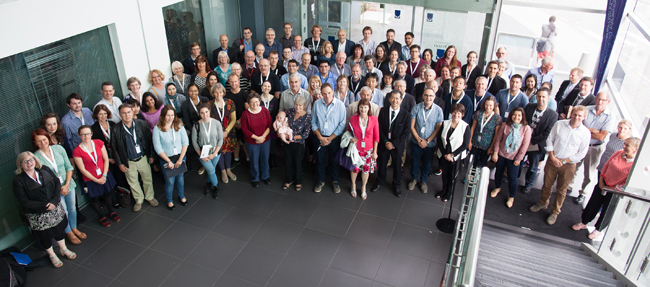 Scientists from around the world this week celebrated the exceptional career of Professor Christine Winterbourn, whose research in the area of free radical science has spanned more than four decades.
Scientists from around the world this week celebrated the exceptional career of Professor Christine Winterbourn, whose research in the area of free radical science has spanned more than four decades.
Professor Winterbourn says she enjoyed the gathering of so many past students, colleagues and collaborators and listening to them describe their experiences of working or interacting with her over the years. In her
Festschrift address, she recounted her memories of the development of the field of free radical biology from its early beginnings, how her work influenced this development, and the pleasure she had derived from her research career.
Professor Tony Kettle is the director of the Centre for Free Radical Research and one of the many scientists Professor Winterbourn has mentored.
He says it was essential a Festschrift be held for Professor Winterbourn because of her enormous contribution to science in New Zealand and internationally.
Professor Kettle says the Festschrift was a great success with speakers all acknowledging Professor Winterbourn's amazing contribution to science. A highlight was the presentation by the Vice Chancellor Professor Harlene Hayne of a book (entitled A Radical Life) containing tributes from more than 50 of her students and colleagues.
Read the media release about the Festschrift
Read the full article on the Otago Bulletin Board
November 2015
NZSO Translational Research Award for free radical professor
Professor Margreet Vissers was the 2015 recipient of the New Zealand Society for Oncology Translational Research Award.
The award was given in recognition of Professor Vissers' vitamin C and cancer research. It was presented to her at the Society's annual conference held in Christchurch at the beginning of November.
October 2015
Sunday Morning on Radio New Zealand: Antibiotic resistance
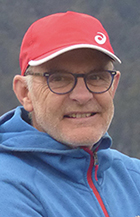 Professor Tony Kettle from the Centre for Free Radical Research discussed antibiotic resistance on Radio New Zealand's Sunday Morning programme on 18 October 2015.
Professor Tony Kettle from the Centre for Free Radical Research discussed antibiotic resistance on Radio New Zealand's Sunday Morning programme on 18 October 2015.
Antibiotic resistant bacteria is fast becoming a global health issue. Professor Kettle told Radio New Zealand that antibiotics could become useless against infections within 10 years unless we change the way we use them.
The Centre was awarded $4.8 million by the HRC earlier this year to investigate new ways of diagnosing and treating bacterial infections.
Listen to the interview on Radio New Zealand
September 2015
TVNZ One News: Vitamin C and cancer study funding for CFRR Principal Investigator
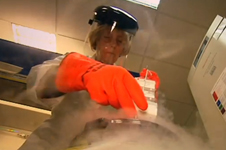 Principal Investigator Professor Margreet Vissers featured on TVNZ's One News on Tuesday, 28 September 2015.
Principal Investigator Professor Margreet Vissers featured on TVNZ's One News on Tuesday, 28 September 2015.
The news item was about recent funding Margreet received from the New Zealand Breast Cancer Foundation and the Canterbury Medical Research Foundation to further her work on vitamin C and cancer.
Margreet and her team will use the funds to investigate if high dose vitamin C is a viable cancer therapy by exploring its effect on breast tumours.
Margreet says the use of vitamin C by cancer patients is commonplace, but controversial. While there are reports of success, there is little scientific evidence to help our understanding of the role vitamin C might play.
Watch the One News item
Read the press release this study
Learn more about the Cancer and Vitamin C Trust
Otago Magazine: Battling the bugs
 Professor Tony Kettle discussed antimicrobial resistance in issue 41 of Otago Magazine.
Professor Tony Kettle discussed antimicrobial resistance in issue 41 of Otago Magazine.
The Centre for Free Radical Research were recently awarded a $4.8 million Health Research Council (HRC) programme grant to find new ways to diagnose and treat bacterial infections.
This grant recognises the significant threat posed by growing rates of global infections and the declining ability of antibiotics to kill bacteria that cause fatal infections.
Over the next five years Tony and his team will develop better ways to determine exactly which bacteria are responsible for an infection so the right antibiotics can be used. They also aim to determine how some bacteria evade neutrophils and promote serious infections, thus helping identify new strategies for the development of new types of antibiotics.
Read the Otago Magazine article
UOC Research Seminar Series: BBiomedSc(Hons) Presentations
Our BBiomedSc(Hons) spoke at the UOC Research Seminar Series in the lead up to their oral presentation assessment in Dunedin on 22 September.
Mark Brinsden presented on 14 September 2015 about the Measurement of mitrochondrial dysfunction in humans.
Melanie Hamzah and Sarah Drake both spoke on 21 September 2015.
Melanie discussed the Inactivation of thiol-dependent enzymes by urate hydroperoxide and Sarah talked about Investigating the pro-apoptotic properties of portimine.
CMRF grant success for two emerging researchers
 The Centre for Free Radical Research received two of the Canterbury Medical Research Foundation's Major Project Grants for Emerging Researchers.
The Centre for Free Radical Research received two of the Canterbury Medical Research Foundation's Major Project Grants for Emerging Researchers.
Senior Research Fellow Dr Anitra Carr was given funding to investigate Vitamin C requirements in severe infection.
A grant was also awarded to Research Fellow Dr Juliet Pullar for a project on Red blood C=cell vitamin C: a useful indicator or patient ascorbate status?
Conference Award: SFRR-E/SNFS Meeting: Redox Biology Meets Nutrition
PhD student Emma Spencer received the NFS Journal Young Investigator Award at the SFRR-E/SNFS Meeting: Redox Biology Meets Nutrition held in Stuttgart, Germany on 2-4 September 2015.
Emma also took out second place in the poster competition at the Conference for Young Scientists 2015 at the National Academy of Sciences, Kyiv, Ukraine.
June 2015
CFRR researcher recipient of an Early Career Award for Distinction in Research
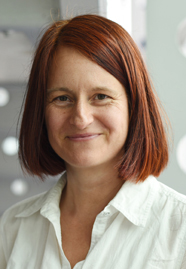 Dr Anitra Carr is one of five Otago researchers who have been recognised with Early Career Awards for Distinction in Research.
Dr Anitra Carr is one of five Otago researchers who have been recognised with Early Career Awards for Distinction in Research.
Anitra is currently researching the role of vitamin C in acute and chronic disease, such as cancer.
“I was really surprised and pleased to receive this award. As a working mother who has had to take time out from research to raise children, I appreciate still being considered eligible for this early career award.”
Each Award recipient receives $5000 to support their research and scholarly development.
HRC funding to find new ways to save lives by killing antibiotic-resistant bacteria
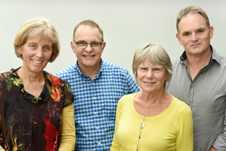 The Centre for Free Radical Research has been awarded $4.8 million in Health Research Council funding over the next 5 years to find new ways to diagnose and treat bacterial infections.
The Centre for Free Radical Research has been awarded $4.8 million in Health Research Council funding over the next 5 years to find new ways to diagnose and treat bacterial infections.
Our program of research recognises the significant threat posed by growing rates of global infections, and the ever decreasing ability of antibiotics to kill bacteria that cause fatal infections. Research projects will be led by Professors Mark Hampton, Margreet Vissers, and Christine Winterbourn.
Antimicrobial resistance is recognised by Governments and international medical bodies as a serious threat to health and lives. Dire scenarios predict that within the next decade people will die from infections we now treat simply with antibiotics.
Professor Tony Kettle says the overuse of antibiotics, particularly general ones that target many types of bacteria, has allowed a wide range of bugs to develop resistance, and render many common antibiotics useless.
Over five years, the Centre will:
- Develop better ways to determine exactly which bacteria are responsible for an infection so the right antibiotics can be used.
- Understand how some bacteria evade neutrophils and promote serious infections.
- Identify new strategies for the development of new types of antibiotics.
The HRC also awarded Professor Kettle $800,000 to understand how white blood cells damages the lungs of young children with cystic fibrosis.
May 2015
HRC Feasibilty Study Grant awarded to study vitamin C and cancer
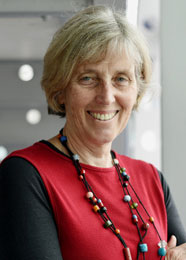 Principal Investigator Professor Margreet Vissers has been awarded a HRC feasibility study grant for a vitamin C and cancer study.
Principal Investigator Professor Margreet Vissers has been awarded a HRC feasibility study grant for a vitamin C and cancer study.
Margreet has done many studies on vitamin C, and in both laboratory studies and the analysis of human cancer tissue has found evidence that the more ascorbate a cancerous tumour contains, the slower it grows.
With the $100,000 HRC grant, Margreet and her team will collect tumour tissue from colorectal cancer patients, before and after surgery, to determine whether vitamin C accumulates in the tumour tissue and whether this affects its biology in a way that could slow cancer growth and spread.
Many cancer patients seek alternative therapies for their disease, with the administration of high-dose vitamin C (ascorbate) being commonplace. This practice continues despite a lack of evidence as to its efficacy and a lack of understanding of how vitamin C might be of benefit.
The Press: Free Radicals to wage war on bacteria
On 14 May 2015 The Press featured an article about our collaboration with The Infection Group to address the global issue of increasing antibiotic resistance.
Find out more about this research collaboration
UOC Research Seminar Series: PhD Students
Two of our PhD students spoke at the UOC Research Seminar Series on Monday 11 May in the Beaven Lecture Theatre.
Kate Vick discussed the Role of peroxiredoxins in protecting cancer cells from oxidative stress. Kate is supervised by Prof Mark Hampton and Prof Christine Winterbourn.
Annika Seddon, who is supervised by Prof Mark Hampton, Prof Tony Kettle and Dr Margaret Currie, spoke about Neutrophil death pathways and their impact on tumour biology.
March 2015
UOC Research Seminar Series: Prof Margreet Vissers
Professor Margreet Vissers spoke at the UOC Research Seminar Series on 30 March in the Beaven Lecture Theatre. Her seminar focused on the Regulation of the 2-oxoglutarate-dependent dioxygenases and implications for health and disease.
International Women's Day Breakfast with Professor Christine Winterbourn
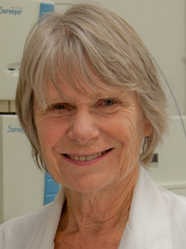 Professor Christine Winterbourn will be presenting at the Canterbury Women Researchers International Women's Day Breakfast on Monday 9 March at The Atrium on Hagley Avenue.
Professor Christine Winterbourn will be presenting at the Canterbury Women Researchers International Women's Day Breakfast on Monday 9 March at The Atrium on Hagley Avenue.
Christine will be presenting on Dealing with life's stresses: the role of antioxidants, and all women researchers in Canterbury are invited to attend this breakfast and seminar.
The breakfast is co-hosted by the Canterbury Women's Club Inc. and the United Nations Association Canterbury Branch.
February 2015
UOC Research Seminar Series: Prof Mark Hampton and Usha Pujary
Principal Investigator Professor Mark Hampton opened the UOC Research Seminar Series for 2015 on the 16 February in the Rolleston Lecture Theatre with a presentation on Necroptosis: a newly discovered cell death pathway.
PhD student Usha Pujary gave her exit seminar as part of the UOC Research Seminar Series in the Beaven Lecture Theatre on 23 February. Her talk and PhD thesis focussed on The Effect of Hypoxia on Neutrophil Survival and Function.
January 2015
CFRR Summer Student awarded Best Laboratory Project Prize
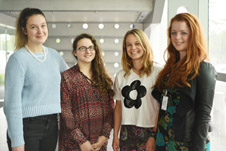 CFRR summer student Helena Trollope was awarded the Best Laboratory Project Prize at the UOC Summer Student Final Presentations session on Friday, 31 January.
CFRR summer student Helena Trollope was awarded the Best Laboratory Project Prize at the UOC Summer Student Final Presentations session on Friday, 31 January.
Helena's project was on the reactions of urate hydroperoxide with biological targets. She was supervised by Prof Tony Kettle.
The CFRR had four other summer students this year, who also presented the findings from their 10 week projects:
Under the supervision of Dr Andree Pearson and Prof Mark Hampton, Mark Brinsden focused on the measurement of mitochondrial dysfunction in humans.
Sarah Drake's project was on MIF modification and the regulation of inflammation. She was supervised by Prof Mark Hampton and Dr Nina Dickerhof.
Susannah Dunham investigated if the vitamin c content of red blood cells is a more stable indicator of body ascorbate status, under the supervision of Dr Anitra Carr and A/Prof Gabi Dachs.
Investigating the pathology of cobalt-induced pseudo-tumour formation was Simona Seizova's project. Simona was supervised by Prof Margreet Vissers, Dr Tim Woodfield and Prof Gary Hooper.